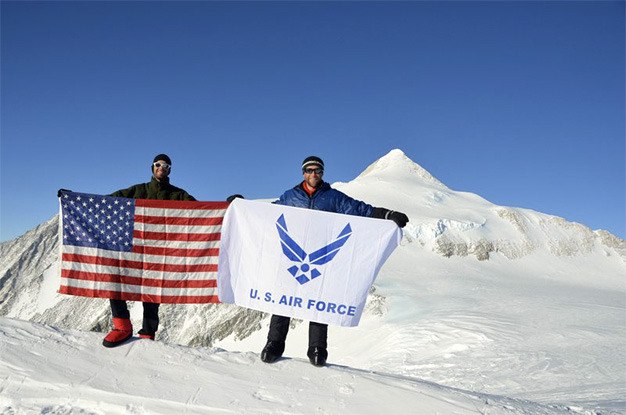Mercer Island High School graduate Rob Marshall, 32, said that stepping off an airplane in Antarctica was the closest thing to stepping on another planet than anything else he has experienced. There are no smells, no plant life, no animals — just white, but beautiful, he said.
It was just one month ago that he and fellow airman, Graydon Muller, reached the 16,077-foot summit of Mt. Vinson in Antarctica, as part of the “Air Force Seven Summits Challenge,” which Marshall co-founded. The goal is for members of the Air Force special forces to climb each of the highest peaks on each of the seven continents. The team is also raising money for the “Special Operations Warrior Foundation,” a 501(3)(c) nonprofit founded in 1980, which provides financial support for the children of fallen special operations troops so that they may go to college.
Marshall said the grants are for children who have lost a mother or father who served in any branch of special forces, not just the Air Force.
“We’re doing something we love, but we’re generating more than just personal enjoyment,” Marshall said.
Marshall joined the Air Force right out of high school in 1997, attending the academy in Colorado.
“I just always wanted to be a pilot,” he said. “We had a good family background in the military, and I also enjoy the leadership aspect.”
He flies the CV-22 “Osprey,” which takes off like a helicopter but moves like an airplane, built by Boeing and Bell together. He calls it a “transformer.” He became interested in mountain climbing since he took outdoor fitness from Fran Call, a Mercer Island teacher who was a huge inspiration to him. She started the program in 1971, teaching it until she retired in 1993.
“I had bicycled across the U.S. with some students, and the principal asked if I wanted to start an alternative P.E. class,” Call said. “Incredibly, I got to select the students who got to take the class. I had to select kids who I knew would obey me. Even then I had a high evaluation of Rob — he was a little kid, but he tried and he did really extraordinary things. Most of the things we did needed more determination than skill.”
His confidence in outdoor skills, which he learned from Call, resulted in a climb of Oregon’s Mt. Hood while he was still in high school.
“We knew enough to be safe, but not classy,” Marshall said.
After graduating from the Air Force Academy in 2001, he hopped on a plane to Nepal, hiking throughout the Himalayas. He gazed up at Mt. Everest and thought, “I could climb this someday, but why?” Around this time there was a great deal of negative press about service members, so he decided it was time for a positive story.
“No American military group has tried to climb Everest,” he said.
Then in 2005 he met Mark Uberuaga, who as it turns out, is also from Washington state. He had on a mountaineering jacket.
“So, here’s another special forces guy who is also a mountain guy,” Marshall said. “It was fate that he knocked on my door.”
Suddenly a plane crash in Albania killed nine troops, many of them friends of the two men. Eleven children were left without a parent.
To honor the fallen and their families, the “Special Operations Warrior Foundation” was born. Marshall and Uberuaga were off to climb Mt. Elbrus in Western Russia. A year later the two men with eight others — four of them women — scaled Mt. Kilimanjaro in Africa. In 2007, Marshall and two others climbed the highest peak in South America, Mt. Aconcagua, a whopping 22,800 feet in the air.
North America’s Mt. McKinley was the target for 2008, but Marshall’s schedule prohibited him from going. Nonetheless, five men and one woman made it, and as usual, planted the USAF flag on the summit. Marshall went back to climb McKinley on his own at a later date. He was one day from the top when a satellite phone call ended that dream. He was needed back at work immediately to help launch the Osprey.
Then there was Antarctica. Now, all the team has left is a small mountain in Australia — only 7,000 feet, and of course, Everest, which is planned for May 2012, weather permitting.
Marshall doesn’t know where he gets his drive. He gets a goal in mind and just goes for it. His goal after high school was to fly, then it was to get into special forces, then to climb the seven summits. He said adding the charitable angle only makes it sweeter.
He credits his success for just growing up on Mercer Island. He is now stationed at Hurlburt Field in Florida after two deployments in Iraq and one in Afghanistan. Soon he’ll be transferring to Amarillo, Texas, where he will be an “acceptance pilot,” making sure new aircraft are acceptable for flight.
Beyond that?
“Maybe I’ll teach, maybe get into politics,” Marshall said.



